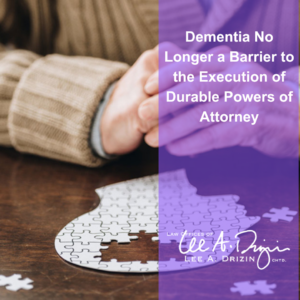Important Changes to Power of Attorney Nevada Laws
In 2019 the Nevada Legislature enacted several bills having a significant impact regarding the laws pertaining to durable powers of attorney (“DPOA”).
This post discusses:
- the importance of durable Nevada power of attorney in your estate plan;
- revisions which allow you to address expressions of intent to remain at home in the event of incapacity;
- the language that should be included in every DPOA (but is likely not present) to avoid court intervention;
- the potential problems of Do-It-Yourself documents.
The Importance of Durable Powers of Attorney
A DPOA enables you (the “principal”) to provide instructions to a third party (the “agent”) regarding crucial decisions when you are incapacitated and no longer able to manage your health care decisions or financial matters without assistance.
Properly executed DPOAs will authorize your agent to provide assistance without having to resort to filing for guardianship proceedings in the applicable court. The delays and costs encountered by loved ones having to seek guardianship can be significant.
Expression of Intent to Remain At Home
A new section has been enacted by the Nevada Legislature to be included in all statutory durable Nevada power of attorney whereby the principal can indicate a desire to remain at home in the event of incapacity. It should be remembered that until a person becomes incapacitated they always have the ability to make their own healthcare and financial decisions.
The new statutory forms now contain two options which a principal can choose from to reflect his or her intent to remain at home.
-
Option No. 1 – Remaining at home as long as it is safe
This option provides as follows:
It is my intention to live in my home as long as it is safe and my medical needs can be met. My agent may arrange for a natural person, an employee of an agency, or a provider of community-based services to come into my home to provide care for me.
When it is no longer safe for me to live in my home, I authorize my agent to place me in a facility or home that can provide any medical assistance and support in my activities of daily living that I require. Before being placed in such a facility or home, I wish for my agent to discuss and share information concerning the placement with me.
A 2018 survey by AARP 1 indicated that three out of four adults age 50 and older want to stay in their homes and communities as they age – yet many don’t see that happening for them. While 76% of Americans age 50 and older say they prefer to remain in their current residence and 77% would like to live in the community as long as possible, just 59% anticipate they will be able to stay in their community.
Option No. 1 provides direction to the agent regarding the principal’s desire to remain at home and authorizes the agent to use reasonable efforts to have the principal remain at their home as long as it is safe and the principal’s medical needs can be met.
-
Option No. 2 – No removal from home without the appointment of a guardian.
This option presents a much stronger direction to the agent and states:
It is my intention to live in my home for as long as possible without regard for my medical needs, personal safety, or ability to engage in activities of daily living. My agent may arrange for a natural person, an employee of an agency, or a provider of community-based services to come into my home and provide care for me. I understand that, before I may be placed in a facility or home other than the home in which I currently reside, a guardian must be appointed for me.
Option No. 2 is appropriate for the person who wants to remain at home under any circumstances. Ironically, while DPOAs are intended to facilitate the avoidance of court intervention, as well as the time and expense associated with such action, this option will now require court authorization even when the agent, as well as the principal’s treating physician, believe it is no longer safe for the principal to remain at home.
Concerns Regarding Changes of Power of Attorney Nevada Laws
Even though Option No. 1 provides more discretion to the agent, there are concerns that this option fails to consider numerous important factors other than safety in making a decision to comply with the principal’s desire to remain at home.
In light of the growth of the many home care agencies now available to seniors, it is now much easier to make arrangements to provide assistance to a principal desiring to stay at home despite physical and/or mental limitations.
However, this type of care is expensive, particularly if 24 our nursing care is required. As a result, although arrangements can be made to provide the care at home needed to keep the principal safe, once the estate is substantially depleted, difficult decisions may have to be made regarding alternative arrangements to maintain comparable quality of care for the senior.
In addition, the principal may not have family or friends nearby to check on a regular basis him or her and ordered him to monitor any in-home care. Moreover, while the principal may be able to remain at home, this may result in them being isolated. The 2018 AARP Survey reflected that three in ten older adults reported lacking companionship, feeling left out, or feeling isolated from others.
Other options may offer group activities, socialization inner interaction which improve the quality of the principal’s life rather than continues to live alone. These issues are important and should be carefully considered in determining if you desire to include an expression of intent regarding your living arrangements to be reflected in the DPOA.
Absence of Language Specifically Authorizing Alternative Living Arrangements.
It was previously believed that the grant of general authority contained in statutory DPOAs was broad enough to include the ability of the agent to make arrangements for a loved one to be transferred to an assisted care or skilled nursing facility. However, the revised statutory provisions reflect that the Legislature did not agree.
The new form advises the principle that:
“You have the right to determine whether to authorize the person designated in this document to make decisions for you about where you live when you are no longer capable of making that decision. If you do not provide such authorization to the person designated in this document, that person may not be able to assist you to move to a more supportive living arrangement without obtaining approval through a judicial process.”
While the enactment of the recent changes provides for two options regarding the principal’s desire to remain at home, the revised statutory DPOA form does not specifically authorize an agent to be able to transfer the principal to alternative living arrangements. As result, in order to avoid court intervention, this language should be included in the special instructions section of the DPOA’s.
The Dangers of Do-It-Yourself Estate Plans.
In recent years, do-it-yourself (“DIY”) providers have emerged in many fields ranging from income tax preparation to estate planning. These services purport to provide, at low cost, the ability to generate computer-drafted documents that may bear some of the hallmarks of professionally-prepared documents. While these services provide tools to enable the DIY project, as with the home improvement world, they should be used with caution.
The emergence of DIY companies resulted in the American Bar Association Section of Real Property Trust & Estate Law (the “Section”) to designate a Task Force to evaluate the use of DIY methods in estate planning. The Task Force urges those who may engage in DIY estate planning to consider that an estate planning lawyer provides more than technical expertise in drafting complicated documents. Most have extensive experience in counseling clients in these most intimate decisions.
Planning your estate isn’t necessarily fun but the failure to plan can be devastating. Hopefully, it is clear from this discussion that executing a DPOA is not a task that should be taken lightly. An experienced estate planning attorney can assist you in addressing these stressful, but important, issues in your plan.
1 Binette, Joanne and Kerri Vasold. 2018 Home and Community Preferences: A National Survey of Adults Age 18-Plus. Washington, DC: AARP Research, August 2018.
For more than 30 years, Attorney Lee A. Drizin has practiced in the areas of estate planning, probate, trusts, guardianship, and real estate matters representing clients throughout the state of Nevada.
Drizin Law is providing this information for educational purposes only. It should not be construed as legal advice or a legal opinion as to any specific facts or circumstances. This information is based on general principles of Nevada law at the time it was created and you should be aware laws frequently change. Moreover, the laws affecting you may differ depending on the circumstances. You should consult with a qualified attorney in your own state or jurisdiction concerning your particular situation. A review of this information does not create an attorney-client relationship.








